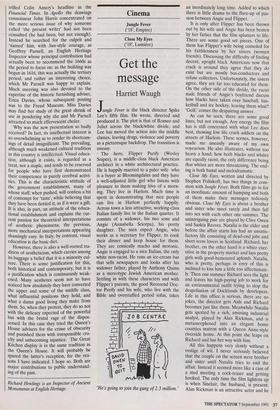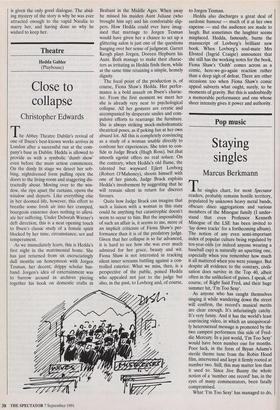Cinema
Close My Eyes ('18', Lumiere)
Get the message
Harriet Waugh
Jungle Fever is the black director Spike Lee's fifth film. He wrote, directed and produced it. The plot is that of Romeo and Juliet across the black/white divide, and Lee has moved the action into the middle classes, leaving drugs, violence and poverty as a picturesque backdrop. The transition is uneasy.
The hero, Flipper Purify (Wesley Snipes), is a middle-class black American architect in a white architectural practice. He is happily married to a paler wife who is a buyer at Bloomingdales and they have a well-adjusted little girl who listens with pleasure to them making love of a morn- ing. They live in Harlem. Much time is spent in demonstrating that nice people can live in Harlem perfectly happily. Across town a less attractive, working-class Italian family live in the Italian quarter. It consists of a widower, his two sons and Angie (Annabella Sciorpa), his pretty daughter. The men expect Angie, who works as a secretary for Flipper, to cook their dinner and keep house for them. They are comically macho and moronic. Angie is engaged to a nice Italian, the only white non-racist. He runs an ice-cream bar that sells newspapers and looks after his widower father, played by Anthony Quinn as a stereotype Jewish American mother. Settling in with these characters and with Flipper's parents, the good Reverend Doc- tor Purify and his wife, who live with the Bible and overstuffed period sofas, takes 'He's going to join the gang of 2.3 million.' an inordinately long time. Added to which there is little drama to the flare-up of pas- sion between Angie and Flipper.
It is only after Flipper has been thrown out by his wife and Angie has been beaten by her father that the film splutters to life. There are some good set pieces. One of them has Flipper's wife being consoled for his faithlessness by her sisters (women friends). Discussing the difficulty of finding decent, upright black Americans now that crack is around they agree that they do exist but are mostly bus-conductors and refuse collectors. Unfortunately, the sisters agree, they are far too educated for them. On the other side of the divide, the racist male friends of Angie's boyfriend discuss how blacks have taken over baseball, bas- ketball and ice hockey, leaving them what? 'Golf,' comes the despairing answer.
As can be seen, there are some good lines, but not enough. Any energy the film has is still concerned with what Lee does best, showing low life crack addicts on the streets of Harlem. These scenes, however, made me uneasily aware of my own voyeurism. He also illustrates, without too heavy a hand, how both blacks and whites are equally racist, the only difference being that whites are more threatening. The end- ing is both banal and melodramatic.
Close My Eyes, written and directed by Stephen Poliakoff, has two things in com- mon with Jungle Fever. Both films go in for an inordinat.t amount of humping and both of them make their messages tediously obvious. Close My Eyes is about a brother and sister who meet rarely and then fall into sex with each other one summer. The unintriguing pair are played by Clive Owen and Saskia Reeves. Natalia is the elder and before the affair starts has had an unsatis- factory life consisting of dead-end jobs and short-term lovers in Scotland. Richard, her brother, on the other hand is a whizz exec- utive in the property market and lays pretty girls with good-humoured aplomb. Natalia, who is pretty, perhaps in envy of this is inclined to kiss him a little too affectionate- ly. Then one summer Richard sees the light and leaves his high-paying job to work for an environmental outfit trying to stop the despoliation of Docklands by developers. Life in this office is serious, there are no jokes, the director gets Aids and Richard becomes just like them. Meanwhile Natalia gets spotted by a rich, amusing industrial analyst, played by Alan Rickman, and is metamorphosed into an elegant home counties matron with a Queen Anne-style riverside home. At this point she leaps on Richard and has her way with him.
All this happens very slowly without a vestige of wit. I never seriously believed that the couple on the screen were brother and sister until Natalia tries to end the affair. Instead it seemed more like a case of a stud meeting a cock-teaser and getting hooked. The only time the film lightens up is when Sinclair, the husband, is present. Alan Rickman is an attractive actor and he is given the only good dialogue. The abid- ing mystery of the story is why he was ever attracted enough to the vapid Natalia to marry her, and having done so why he wished to keep her.



















































 Previous page
Previous page